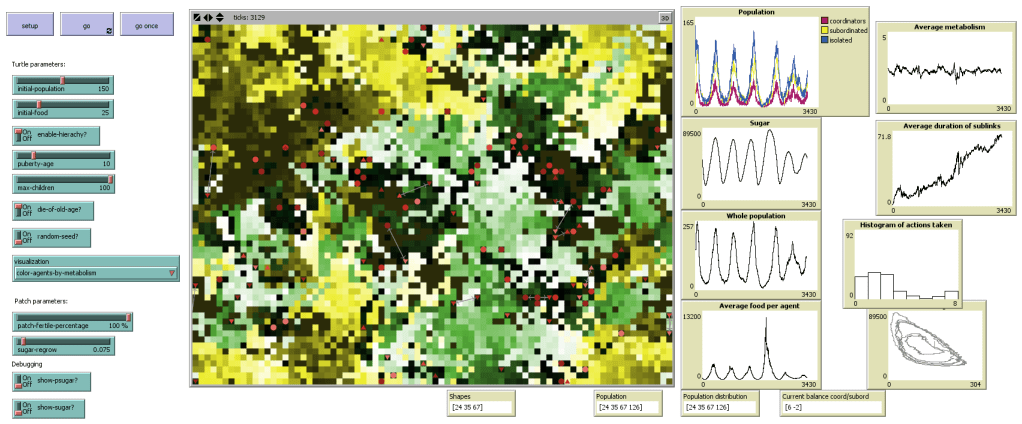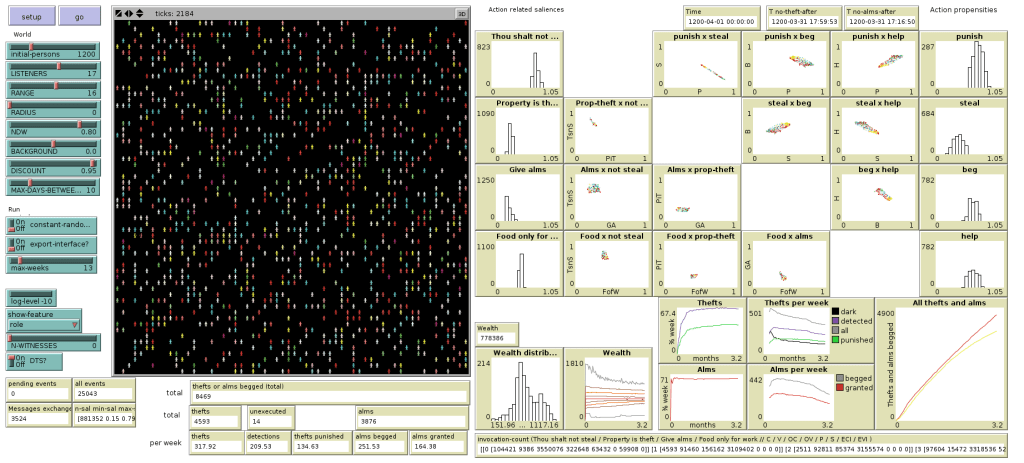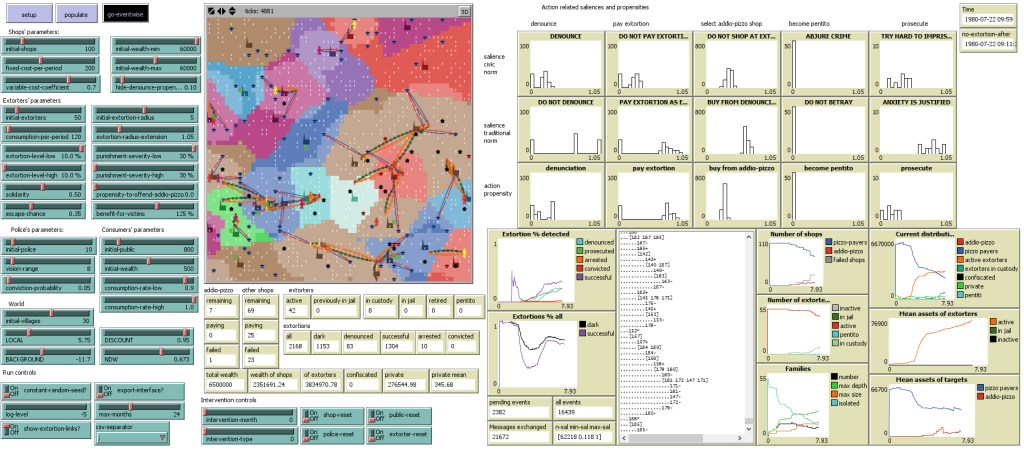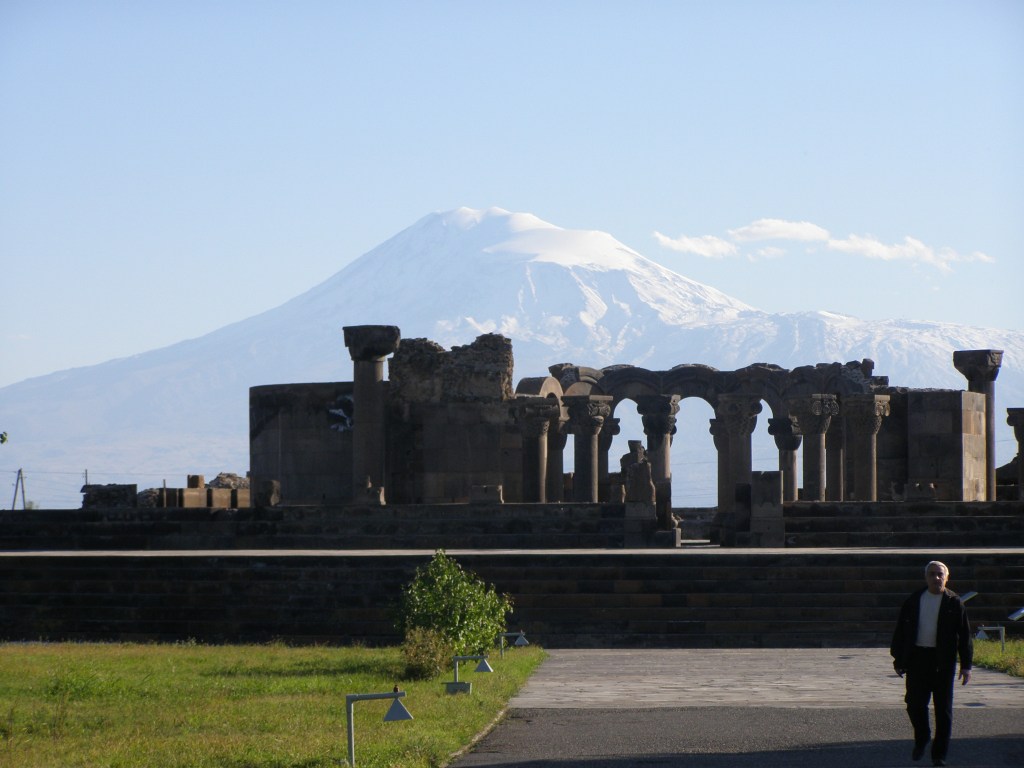My CV and a complete list of publications can be found here and below, respectively. Some presentation and interview videos are also available. More simulation models will be added soon. And my other interests can be found here.
Simulation Models
Bilingualism in a small population

The paper analyses how bilingualism spreads in a small population. It starts with three different mathematical models of a stochastic process in which individuals learn a second language from their parents and/or with a probability which depends on the current sizes of the language communities. The simulation version of the model is a multi-agent model which assumes that a small population, some of them bilingual, but most of them speaking only one of two languages, immigrates into an empty piece of land and that their members search convenient places to live on and to find mates for reproducing.
Simulation results show that the final distribution of members of the two unilingual communities and the bilingual group depends on the initial regional distribution and on mobility restrictions and that the features predicted by the mathematical solution are not found in all runs where it should have been expected from the mathematical analysis.
Hierarchies and sustainability
A model showing that communication and group building helps am artificial society to survive

The paper describes asexually reproducing agents in a sugarscape-like world who move around and feed on resources. Agents have a number of possible actions: move, gather food, breed offspring, subordinate and unsubordinate, start and end co-ordinating, and, last but not least, rest.
Some of the agents may act as co-ordinators for others. Co-ordinators and subordinates co-operate: co-ordinators give their subordinates hints at where resources can be found, subordinates share their information with co-ordinators and pay them a contribution for their co-ordinating work. Thus, the emergence of a (rather flat) hierarchy can be modeled.
Resources grow and are eaten, and they can spread into neighbouring fields. If all resources in a field are eaten, growth of resources ceases until seed is spread from a neighbouring field. An agent will eat all or part of the resources in the field it is living in, depending on the value of its attributes gatherAmount (the maximal amount it will consume) and gatherRest (the minimal amount it leaves on the field). Thus, sustainability can be modeled.
User-accessible parameters of the JAVA simulation program facilitate user control over a wide variety of features of the model.
One of the simulation results is that in a hierarchical agent society sustainability can easier be achieved than in a society of isolated agents.The screenshot above is from a newer NetLogo version of the model (the one used in this paper).
Abelson and Bernstein revisited
A replication of Abelson’s and Bernstein’s 1963 community referendum campaign simulation

This model is a replication of Abelson’s and Bernstein’s model in their article “A Computer Simulation Model of Community Referendum Controversies” (1963), republished as one of the key articles in the emerging field of computational social science in the section on “Precursors and Early Work” in a recent (2010) collection of computational social science papers, and as this paper is often cited in the context of opinion dynamic models, it lends itself as an example for a middle range theory of opinion formation in a rather large group of individuals. This theory was expressed in natural language and in a computer code which is unfortunately lost without traces. This middle range theory was applied to the process in which citizens of a county in the US formed their opinions with respect to a local political issue — the fluoridation of their drinking water —, but could also have been — or be — applied to any other (preferably local) issue in a community referendum.
As a matter of course, the simulation model contains many more places, citizens, sources and channels.
The idea behind Abelson’s and Bernstein’s model was that during a campaign citizens are exposed to messages coming from sources such as journalists and politicians via media channels such as television and press and at the same time to messages which they exchange among themselves at certain places where they usually meet. Whereas a source only produces messages whose content depends on its general attitude to the issue at stake and channels only forward these to interested citizens, citizens select among these messages depending on whether they like source and/or channel and forward them to other citizens and produce messages of their own.Every message processed by a citizen changes the attitude of this citizen toward the general issue and also toward each of the sources whose messages it had processed.
Results of some example runs can be found here.
Lawlike rules emerge without the intervention of legislators
Traffic model: Car drivers agree to use the left side of the street

The paper shows that in an artificial society lawlike rules emerge “as a result of individual action but without being designed by any individual” agents [Hayek 1944, p. 288] and discusses earlier literature on the topic. The first example which this paper uses is an artificial society of car drivers moving between their homes and their working places on streets with two lanes crossing each other at right angles. Car drivers start using the left or right lane of the street at random and continue to use the same side of the street until they are stopped by an oncoming car. In this occasion one them decides to change to the other side of the street, taking into account which side of the street is used by the locally visible majority. This very simple behaviour usually results in a society- wide applied rule: always using the same side of the street. How long it takes for all car drivers to abide by the emerged rule (and how many, if not all, apply the rule) depends on the density of traffic and the range of vision of the car drivers as well as on the distance the cars went.
Theft model: Agents learn norms about theft, theft punishment, alms asking and alms giving

A second example of emerging rule-consistent behaviour discussed in the pa- per and analysed with different mathematical and computational methods is de- rived from a model of the the emergence of aggression aversion extended to a model of the emergence of a rule against theft and of a rule in favour of almsgiving. In this model agents receive comments on their theft and alms related actions and form a normative board which controls their propensity to act with respect to theft, prosecuting and punishing theft, asking for and granting alms. This model shows an emerging anti-theft norm whose salience among the agents increases in a rapid transition after a fairly long initial phase during which theft is more or less tolerated.
Extortion rackets in Zombieland
This model was part of the GLODERS project (Global Dynamics in Extortion Racket Systems). It shows a virtual region with several subregions and “families” of Mafia-like criminals extorting enterprise owners. Both criminals and enterprise owners as well as law enforcement officers learn and adapt their norms.


A chapter in the final GLODERS book gives more details.
Presentations and Interviews
Klaus G. Troitzsch in the ECPR Standing Group on Political Culture
Political Culture Lecture Series: Values and Cleavages in European Political Cultures in the Past Decade: Cleavages within Countries, November 2024
Klaus G. Troitzsch in the ECPR Standing Group on Political Culture
Political Culture Lecture Series: Values and Cleavages in European Political Cultures in the Past Four Decades, April 2024
Klaus G. Troitzsch on being rewarded the Fourth Rosaria Conte Outstanding Contribution Award for Social Simulation award, September 2022
Klaus G. Troitzsch am Österreichischen Wissenschaftstag 2021: Modellbildung und Simulation in den Wissenschaften (in German)
Klaus G. Troitzsch on the importance of social simulation and validation of models at SSC2015 in Groningen NL
ESSA Summer School 2013: Talk on Simulation and Significance, Hamburg, Germany 15-19/07/2013
David Hales interviewed Klaus G. Troitzsch at the 2nd ESSA Summer School in Guildford UK in July 2011
Lecture on a general strategy for policy modelling at the second ESSA Summer School in Social Simulation in Guildford UK in July 2011
CSS related publications
| Troitzsch1987IBP DOI Troitzsch, Klaus G. (1987): Interactions between Party Members and Local Party Activists: A Formal Model and its Empirical Application. In: Journal of Mathematical Sociology. Bd. 12. S. 415-438. |
| Troitzsch1987BUL DOI Troitzsch, Klaus G. (1987): Bürgerperzeptionen und Legitimierung. Anwendung eines formalen Modells des Legitimations-/Legitimierungsprozesses auf Wählereinstellungen und Wählerverhalten im Kontext der Bundestagswahl 1980. Frankfurt: Lang. |
| Moehring1988SID Möhring, Michael; Troitzsch, Klaus G. (1988): Simulationsverfahren in den Sozialwissenschaften. In: Faulbaum, Frank; Uehlinger, Hans-Martin: SoftStat `88: Fortschritte der Statistik-Software 1. Stuttgart: Fischer. |
| Troitzsch1989CVI Troitzsch, Klaus G. (1989): Chaotisches Verhalten in einem Sozialsystem. Gegenüberstellung eines Makro- und eines Mikromodells. In: Cambel, Ali B.; Fritsch, Bruno; Keller, Jürgen W.: Dissipative Strukturen in Integrierten Systemen. Baden-Baden: Nomos. S. 173-191. |
| Troitzsch1989MDB Troitzsch, Klaus G. (1989): Mikromodellierung der Bildung politischer Einstellungen in interagierenden Populationen. In: Falter, Jürgen W.; Rattinger, Hans; Troitzsch, Klaus G.: Wahlen und politische Einstellungen in der BundesrePublik Deutschland. Neuere Entwicklungen der Forschung. Frankfurt: Lang. S. 29-57. |
| Troitzsch1990AVW Troitzsch, Klaus G. (1990): Änderungen von Wählereinstellungen als nichtlinearer stochastischer Prozeß. In: Hoffmann-Nowottny, Hans-Joachim: Kultur und Gesellschaft. Gemeinsamer Kongress der Deutschen, der Österreichischen und der Schweizerischen Gesellschaft für Soziologie, Zürich 1988. Beiträge der Forschungskomitees, Sektionen und Ad-hoc-Gruppen. Zürich: Seismo. S. 686-688. |
| Troitzsch1990SIS Troitzsch, Klaus G. (1990): Self-organisation in Social Systems. In: Gladitz, Johannes; Troitzsch, Klaus G.: Computer Aided Sociological Research. Proceedings of the Workshop “Computer Aided Sociological Research” (CASOR’89), Holzhau/DDR, October 2nd-6th, 1989. Berlin: Akademie-Verlag. S. 353-377. |
| Troitzsch1990MUS Troitzsch, Klaus G. (1990): Modellbildung und Simulation in den Sozialwissenschaften. Opladen: Westdeutscher Verlag. |
| Troitzsch1991SIS Troitzsch, Klaus G. (1991): Selbstorganisation in sozialen Systemen. In: Esser, Hartmut; Troitzsch, Klaus G.: Die Modellierung sozialer Prozesse. Neuere Ansätze und Überlegungen zur soziologischen Theoriebildung. Ausgewählte Beiträge zu Tagungen der Arbeitsgruppe “Modellierung sozialer Prozesse” der Deutschen Gesellschaft für Soziologie (1986-1989). Bonn: Informationszentrum Sozialwissenschaften. S. 507-543. |
| Troitzsch1991EVP Troitzsch, Klaus G. (1991): Evolution von Produktionsweisen. In: Glatzer, Wolfgang: 25. Deutscher Soziologentag 1990. Die Modernisierung moderner Gesellschaften. Sektionen, Arbeits- und Ad-Hoc-Gruppen, Ausschuss für Lehre. Opladen: Westdeutscher Verlag. S. 503-506. |
| Troitzsch1991ACO Troitzsch, Klaus G. (1991): A Comparison of Some Models of Processes of Self-Organization. In: Ebeling, Werner; Peschel, Manfred; Weidlich, Wolfgang: Models of Self-Organization in Complex Systems. Berlin: Akademie-Verlag. S. 106-116. |
| Troitzsch1991MPO DOI Troitzsch, Klaus G. (1991): Methodological Problems of Computer Simulation in the Social Sciences. In: Kreutz, Henrik; Bacher, Johannes: Disziplin und Kreativität. Sozialwissenschaftliche Computersimulation: theoretische Experimente und praktische Anwendung. Opladen: Leske+Budrich. S. 37-46. |
| Troitzsch1992EVP DOI Troitzsch, Klaus G. (1992): Evolution von Produktionsweisen. In: Andreß, Jürgen; Huinink, Johannes; Meinken, Holger; Rumianek, Dorothea; Sodeur, Wolfgang; Sturm, Gabriele: Theorie, Daten, Methoden. Neue Modelle und Verfahrensweisen in den Sozialwissenschaften. Theodor Harder zum sechzigsten Geburtstag. München: Oldenbourg. S. 119-140. |
| Troitzsch1992EOP DOI Troitzsch, Klaus G. (1992): Evolution of Production Processes. In: Haag, Günter; Mueller, Ulrich; Troitzsch, Klaus G.: Economic Evolution and Demographic Change. Formal Models in Social Sciences. Berlin: Springer-Verlag, Berlin, Heidelberg, New York. Bd. 395. S. 96-114. |
| Troitzsch1992STR Troitzsch, Klaus G. (1992): Structuralist Theory Reconstruction and Specification of Simulation Models in the Social Sciences. In: Westmeyer, Hans: The Structuralist Program in Psychology: Foundations and Applications. Seattle: Hogrefe & Huber. S. 71-86. |
| Troitzsch1993MPO Troitzsch, Klaus G. (1993): Methodological Problems of Computer Simulation in Social Science. In: Troitzsch, Klaus G.: Catastrophe, Chaos, and Self-Organization in Social Systems. Invited Papers of a Seminar Series on Catastrophic Phenomena in Soviet Society and Self-Organized Behaviour of Social Systems. Held at the Institute of Sociology of the Academy of Sciences of the Ukrainian RePublic, Kiev, September 4 to 11, 1992. Koblenz: Universität Koblenz-Landau. S. 25-38. |
| Klee1993CBI Klee, Andreas; Troitzsch, Klaus G. (1993): Chaotic Behaviour in Social Systems: Modelling with GEMM. In: Troitzsch, Klaus G.: Catastrophe, Chaos, and Self-Organization in Social Systems. Invited Papers of a Seminar Series on Catastrophic Phenomena in Soviet Society and Self-Organized Behaviour of Social Systems Held at the Institute of Sociology of the Academy of Sciences of the Ukrainian RePublic, Kiev, September 4 to 11, 1992. Koblenz: Universität Koblenz-Landau. S. 81-104. |
| Troitzsch1993POO Troitzsch, Klaus G. (1993): Processes of Opinion Formation with Externally Changing Parameters. In: Troitzsch, Klaus G.: Catastrophe, Chaos, and Self-Organization in Social Systems. Invited Papers of a Seminar Series on Catastrophic Phenomena in Soviet Society and Self-Organized Behaviour of Social Systems. Held at the Institute of Sociology of the Academy of Sciences of the Ukrainian RePublic, Kiev, September 4 to 11, 1992. Koblenz: Universität Koblenz-Landau. S. 255-259. |
| Troitzsch1993MMA DOI Troitzsch, Klaus G. (1993): Mathematical Modelling and Computer Simulation of Social Processes: Problems and a New Solution. In: Bulletin de M\’ethodologie Sociologique. Bd. 40. S. 16-42. |
| Troitzsch1994MSI Troitzsch, Klaus G. (1994): Modellierung sozialer Interaktion. In: Schiemenz, Bernd: Interaktion. Modellierung, Kommunikation und Lenkung in komplexen Organisationen. Berlin: Duncker & Humblot. S. 159-180. |
| Troitzsch1994TEO Troitzsch, Klaus G. (1994): The evolution of technologies. In: Doran, Jim E.; Gilbert, Nigel: Simulating Societies: The Computer Simulation of Social Phenomena. London: UCL Press. S. 41-62. |
| Troitzsch1994MSA Troitzsch, Klaus G. (1994): Modelling, Simulation, and Structuralism. In: Kuokkanen, Martti: Structuralism and Idealization. Amsterdam: Editions Rodopi. S. 157-175. |
| Kraul1995LUL Kraul, Margret; Troitzsch, Klaus G.; Wirrer, Rita (1995): Lehrerinnen und Lehrer an Gymnasien: Empirische Ergebnisse aus Rheinland-Pfalz und Resultate einer Simulationsstudie. In: Sahner, Heinz; Schwendtner, Stefan: Kongress der Deutschen Soziologie Halle an der Saale 1995. Kongressband II: Berichte aus den Sektionen und Arbeitsgruppen. Opladen: Westdeutscher Verlag. S. 334-340. |
| Troitzsch1995MKB Troitzsch, Klaus G. (1995): Mathematische Kalküle zur Bildung dynamischer Modelle in den Sozialwissenschaften. Jörg K. Matthias Gsänger (Hrsg.), Modellbildung und Simulation in den Sozialwissenschaften, Forum für interdisziplinäre Forschung 13, Dettelbach: Röll 1995, 9–38 |
| Troitzsch1996CBS Troitzsch, Klaus G. (1996): Chaotic Behaviour in Social Systems. In: Rainer Hegselmann und Heinz-Otto Peitgen (Hrsg.), Modelle sozialer Dynamiken. Ordnung, Chaos und Komplexität, Wien: Hölder-Pichler-Tempsky pp. 162-186 |
| Troitzsch1996SAS DOI Troitzsch, Klaus G. (1996): Simulation and Structuralism. In: Hegselmann, Rainer; Mueller, Ulrich; Troitzsch, Klaus G.: Modelling and Simulation in the Social Sciences from a Philosophy of Science Point of View. Dordrecht: Kluwer Academic Publishers. S. 183-208. |
| Troitzsch1996MMA DOI Troitzsch, Klaus G. (1996): Mathematical Modelling and Computer Simulation of Social Processes. In: Hayashi, Chikio; Scheuch, Erwin K.: Quantitative Social Research in Germany and Japan. Opladen: Leske+Budrich. S. 161-181. |
| Troitzsch1996IEU Troitzsch, Klaus G. (1996): Individuelle Einstellungen und kollektives Verhalten. In: Küppers, Günter: Chaos und Ordnung. Formen der Selbstorganisation in Natur und Gesellschaft. Stuttgart: Reclam. Bd. 9434. S. 200-228. |
| Hegselmann1996MAS DOI Hegselmann, Rainer; Mueller, Ulrich; Troitzsch, Klaus G. (1996): Modelling and Simulation in the Social Sciences from the Philosophy of Science Point of View. Dordrecht: Kluwer Academic Publishers. Bd. 23. |
| Troitzsch1996MS DOI Troitzsch, Klaus G. (1996): Multilevel simulation. In: Troitzsch, Klaus G.; Mueller, Ulrich; Gilbert, Nigel; Doran, Jim E.: Social Science Microsimulation. Berlin: Springer-Verlag, Berlin, Heidelberg, New York. |
| Brassel1997CAC DOI Brassel, Kai; Möhring, Michael; Schumacher, Elke; Troitzsch, Klaus G. (1997): Can Agents Cover All the World?. In: Conte, Rosaria; Hegselmann, Rainer; Terna, Pietro: Simulating Social Phenomena. Berlin: Springer Verlag. Bd. 456. S. 55-72. |
| Troitzsch1997SSO DOI Troitzsch, Klaus G. (1997): Social Simulation – Origins, Prospects, Purposes. In: Conte, Rosaria; Hegselmann, Rainer; Terna, Pietro: Simulating Social Phenomena. Berlin: Springer-Verlag, Berlin, Heidelberg, New York. Bd. 456. S. 41-54. |
| Troitzsch1998MPM Troitzsch, Klaus G. (1998): Multilevel Process Modeling in the Social Sciences: Mathematical Analysis and Computer Simulation. In: Liebrand, Wim B.G.; Nowak, Andrzej; Hegselmann, Rainer (eds.): Computer Modeling of Social Processes. London: Sage. S. 20-36. |
| Troitzsch1998TEO Troitzsch, Klaus G. (1998): The evolution of technologies. In: Ahrweiler, Petra; Gilbert, Nigel: Computer Simulations in Science and Technology Studies. Berlin: Springer-Verlag, Berlin, Heidelberg, New York. S. 103-116. |
| Troitzsch1998VIK Troitzsch, Klaus G.; Möhring, Michael; Meyer, Ulrich; Kröger, Friedebert; Schiepek, Günter; Hendrischke, A. (1998): Verhaltenskoordination im Katastrophenfall – Ein Simulationsmodell. In: Engeli, Max; Hrdlicka, Veronika: ASIM’98 Zürich. 12. Symposium Simulationstechnik. Zürich: S. 443-450. |
| Brassel1998SDU Brassel, Kai; Edenhofer, Ottmar; Möhring, Michael; Schumacher, Elke; Troitzsch, Klaus G. (1998): Soziale Dynamik und technische Innovation. In: KI’98: |
| Troitzsch1999AAD Troitzsch, Klaus G. (1999): Anforderungen an die Gestaltung von Theorien in der Wirtschaftsinformatik. In: Schütte, Reinhard; Siedentopf, Jukka; Zelewski, Stephan: Wirtschaftsinformatik und Wissenschaftstheorie. Essen: Universität Essen. Bd. 4. S. 43-51. |
| Troitzsch1999DMK DOI Troitzsch, Klaus G. (1999): Dynamische Modelle komplexer sozialer Systeme: Was leisten Computersimulationen? In: Mainzer, Klaus: Komplexe Systeme und Nichtlineare Dynamik in Natur und Gesellschaft. Komplexität. Berlin Heidelberg New York: Springer Verlag. S. 321–338. |
| Troitzsch1999STM DOI Troitzsch, Klaus G. (1999): Simulation as a Tool to Model Stochastic Processes in Complex Systems. In: Thomas Brenner (ed.): Computational Techniques for Modelling Learning in Economics, Advances in Computational Economics Volume 11, Dordrecht: Kluwer 1999, 45-69. |
| Brassel1999SDU Brassel, Kai; Edenhofer, Ottmar; Möhring, Michael; Mentges, Elke; Troitzsch, Klaus G. (1999): Soziale Dynamik und technische Innovation. In: Grützner, Rolf; Möhring, Michael: Werkzeuge für die Modellierung und Simulation im Umweltbereich. Marburg: Metropolis. S. 17-32. |
| Gilbert1999SFT Gilbert, Nigel; Troitzsch, Klaus G. (1999): Simulation for the Social Scientist. Buckingham and Philadelphia: Open University Press. |
| Brassel2000MGI DOI Brassel, Kai; Edenhofer, Ottmar; Möhring, Michael; Troitzsch, Klaus G. (2000): Modeling Greening Investors. In: Suleiman, Ramzi; Troitzsch, Klaus G.; Gilbert, Nigel: Tools and techniques for social science simulation. Heidelberg: Physica, pp. 317–343 |
| Troitzsch2000DIB DOI Troitzsch, Klaus G. (2000): Dynamik interagierender Bevölkerungen. In: Mueller, Ulrich; Nauck, Bernhard; Diekmann, Andreas (Hrsg.): Handbuch der Demographie 1: Modelle und Methoden. Berlin: Springer. S. 135–183. |
| Troitzsch2000CIS Troitzsch, Klaus G. (2000): Computersimulationen in den Sozialwissenschaften. In: Dietmar Herz und Andreas Blätte (Hrsg.), Simulation und Planspiel in den Sozialwissenschaften: eine Bestandsaufnahme der internationalen Diskussion, Münster: LIT, 181–203 |
| Moehring2001LAR HTML Möhring, Michael; Troitzsch, Klaus G. (2001): Lake Anderson Revisited. In: Journal of Artificial Societies and Social Simulation. 4/3/1. |
| Koenig2002AHA DOI König, Andreas; Möhring, Michael; Troitzsch, Klaus G. (2002): Agents, Hierarchies and Sustainability. In: Billari, Francesco; Prskawetz-Fürnkranz, Alexia: Agent Based Computational Demography. Berlin/Heidelberg: Physica. S. 197-210. |
| Troitzsch2003SID Troitzsch, Klaus G. (2003): Simulation in den Sozialwissenschaften. In: Orth, Barbara; Schwietring, Thomas; Weiß, Johannes: Soziologische Forschung: Stand und Perspektiven. Opladen: Leske+Budrich. S. 353-363. |
| Gilbert2003SSN DOI Gilbert, Nigel; Troitzsch, Klaus G. (2003): Shakai Simulation no Giho: Seiji, Keizai, Shakai wo Meguru ShikoGijutsu no Frontier [Techniques of Social Simulation: Frontiers of Analysis Techniques in Politics, Sociology, and Economics]. (Japanese translation of Simulation for the Social Scientist by Takashi Iba, Takuya Iwamura, and Yohei Takabe). Tokyo: Nippon Hyoronsha [The Japanese criticism corporation]. |
| Troitzsch2004S Troitzsch, Klaus G. (2004): Simulationsverfahren. In: WISU – Das Wirtschaftsstudium. Bd. 33. Nr. 10. S. 1256-1268, 1300-1302. |
| Troitzsch2004AMM PDF Troitzsch, Klaus G. (2004): A Multi-Agent Model of Bilingualism in a Small Population. In: Coelho, Helder; Espinasse, Bernard: 5th Workshop on Agent-Based Simulation. Erlangen, San Diego: SCS Publishing House. S. 38-43. |
| Troitzsch2004VSM PDF Troitzsch, Klaus G. (2004): Validating Simulation Models. In: Horton, Graham: 18th European Simulation Multiconference. Networked Simulations and Simulation Networks. SCS Publishing House. S. 265-270. |
| Frank2005EPO HTML Frank, Ulrich; Troitzsch, Klaus G. (2005): Epistemological Perspectives on Simulation. In: Journal of Artificial Societies and Social Simulation. 8/4/7 |
| Gilbert2005SFT DOI Gilbert, Nigel; Troitzsch, Klaus G. (2005): Simulation for the Social Scientist. Maidenhead and New York: Open University Press. 2 Auflage, |
| Chmura2005NAS Chmura, Thorsten; Pitz, Thomas; Möhring, Michael; Troitzsch, Klaus G. (2005): NETSIM. A software environment to study route choice behavior in laboratory experiments. In: Representing Social Reality. Foelbach. S. 339-344. |
| Troitzsch2005RSR DOI Troitzsch, Klaus G. (2005): Representing Social Reality. Pre-Proceedings of the Third Conference of the European Social Simulation Association. Fölbach. |
| Troitzsch2006DS Troitzsch, Klaus G. (2006): Dynamische Systemmodelle. In: Diekmann, Andreas: Methoden der Sozialforschung. Sonderheft 44 der Kölner Zeitschrift für Soziologie und Sozialpsychologie. VS-Verlag für Sozialwissenschaften. S. 505-535. |
| Gilbert2006SPC DOI Gilbert, Nigel; Troitzsch, Klaus G. (2006): Simulación para las Ciencias Sociales: Una guía práctica para explorar cuestiones sociales mediante el uso de simulaciones informäticas. Madrid: McGraw-Hill Interamericana de Espana. |
| Troitzsch2006AM Troitzsch, Klaus G. (2006): Agent-Based Modelling. In: Behnke, Joachim; Gschwend, Thomas; Schindler, Delia; Schnapp, Kai-Uwe (Hrsg.): Methoden der Politikwissenschaft. Baden-Baden: Nomos. S. 29-38. |
| Epstein2006FRI Epstein, Jens G.; Möhring, Michael; Troitzsch, Klaus G. (2006): Fuzzy-Logical Rules in a Multi-Agent System. In: Sotsial’no-ekonomicheskie yavleniya i protsessy. Bd. 1. Nr. 1-2. S. 35-39. |
| Gilbert2007IMV Gilbert, Nigel; Troitzsch, Klaus G. (2007): Imitatsionnoe modelirovanie v sotsial’nykh naukakh. Dnipropetrovs’k: Vidavnitsvo Dnipropetrovs’kogo Natsional’nogo Universitetu. |
| Troitzsch2008PMO DOI Troitzsch, Klaus G. (2008): Probabilistic Simulation Models of the Society. In: Rudas, Tamás, ed.: Handbook of Probability Theory and Applications. Sage. S. 275-288. |
| Troitzsch2008SCW PDF Troitzsch, Klaus G. (2008): Simulating collaborative writing: software agents produce a Wikipedia. In: Squazzoni, Flaminio: The Fifth Conference of the European Social Simulation Association, September 1-5, 2008. Brescia. |
| Meyer2008ISO Meyer, Matthias; Lorscheid, Iris; Troitzsch, Klaus G. (2008): Intellectual Structure of Social Simulation as Reflected in the First Ten Years of JASSS -– A Citation and Co-Citation Analysis. In: Squazzoni, Flaminio: The Fifth Conference of the European Social Simulation Association, September 1-5, 2008. Brescia. |
| Troitzsch2008TGC DOI Troitzsch, Klaus G. (2008): The garbage can model of organisational behaviour: A theoretical reconstruction of some of its variants. In: Simulation Modelling Practice and Theory. Bd. 16. Nr. 2. S. 218-230. |
| Lotzmann2008SNF Lotzmann, Ulf; Möhring, Michael; Troitzsch, Klaus G. (2008): Simulating Norm Formation in a Traffic Scenario. In: Squazzoni, Flaminio: The Fifth Conference of the European Social Simulation Association, September 1-5, 2008. Brescia: |
| Troitzsch2009PAC PDF Troitzsch, Klaus G. (2009): Perspectives and Challenges of Agent-Based Simulation as a Tool for Economics and Other Social Sciences. In: Proc. of the 8th Int. Conf. on Autonomous Agents and Multi-Agent Systems (AAMAS 2009). S. 35-42. |
| Troitzsch2009NAE HTML Troitzsch, Klaus G. (2009): Not All Explanations Predict Satisfactorily, and Not All Good Predictions Explain. In: Journal of Artificial Societies and Social Simulation. 12/1/10 |
| Troitzsch2009MSA DOI Troitzsch, Klaus G. (2009): Multi-Agent Systems and Simulation: a Survey From an Application Perspective. In: Uhrmacher, Adelinde; Weyns, Danny: Agents, Simulation and Applications. London: Taylor and Francis. S. 53-75. |
| Lotzmann2009STE PDF Lotzmann, Ulf; Möhring, Michael; Troitzsch, Klaus G. (2009): Simulating the Emergence and Innovation of Norms. In: PerAdaNewsroom. |
| Troitzsch2009SPS PDF Troitzsch, Klaus G. (2009): Social Processes, Simulation Models of. In: Meyers, Robert: Encyclopedia of Complexity and Systems Science. Bd. 9. S. 8405-8420. |
| Lorscheid2009HDA Lorscheid, Iris and Troitzsch, Klaus G. (2009): How do agents learn to behave normatively? Machine learning concepts for norm learning in the EMIL project. In: Proceedings of the 6th Annual Conference of the European Social Simulation Association. |
| Bicking2010RIA Bicking, Melanie; Troitzsch, Klaus G.; Wimmer, Maria A. (2010): Regulatory Impact Assessment: Modelling and Simulation to Facilitate Policy Choices. In: Ernst, A.; Kuhn, S.: Proceedings of the 3rd World Congress on Social Simulation. Scientific Advances in Understanding Societal Processes and Dynamics WCSS2010 (CD-ROM). Kassel, Germany: Center for Environmental Systems Research, University of Kassel. |
| Troitzsch2010AMI Troitzsch, Klaus G. (2010): Agentenbasierte Modellierung im WENKE2 -Projekt. In: Antoni-Komar, Irene; Lehmann-Waffenschmidt, Marco; Pfriem, Reinhard; Welsch, Heinz: WENKE2 – Wege zum nachhaltigen Konsum. Marburg: Metropolis. S. 363-373. |
| Lotzmann2010SNA DOI Lotzmann, Ulf; Möhring, Michael; Troitzsch, Klaus G. (2010): Simulating Normative Agents. In: International Journal of Agent Technologies and Systems. Bd. 2. Nr. 1. S. 31-49. |
| Troitzsch2010CAI DOI Troitzsch, Klaus G. (2010): Communication and Interpretation as Means Of Interaction in Human Social Systems. In: Martinás, Katalin; Matika, Dario; Srbljinovi¢, Armano: Complex Societal Dynamics: Security Challenges and Opportunities. Amsterdam: IOS Press. S. 53-64. |
| Hannappel2011DPW Hannappel, Marc; Bauschke, Simone; Troitzsch, Klaus G. (2011): Demographic projections with microsimulation models. In: Seventh Conference of the European Social Simulation Association. Montpellier: European Social Simulation Association. |
| Meyer2012EPS DOI Meyer, Matthias and Troitzsch, Klaus G. (2012): Epistemological perspectives on simulation: Overview and introduction Computational and Mathematical Organization Theory, 18 (1), 1-4 |
| Troitzsch2012AMV DOI Troitzsch, Klaus G. (2012): Agentenbasierte Modellierung von Märkten. In: Schweizerische Zeitschrift für Forstwesen. Bd. 163. Nr. 10. S. 408–416. |
| Zaggl2012IRI Zaggl, Michael A.; Troitzsch, Klaus G.; Troitzsch, (2012): Indirect Reciprocity in Social Organizations: Replication of Image Scoring and Extension to Networks. In: Koch, Andreas: Interdisciplinary Approaches to Modelling and Simulating Social Processes. Proceedings of the 8th European Social Simulation Association Conference. Salzburg: Selbstverlag des Fachbereichs Geographie und Geologie der Universität Salzburg. Bd. 48. S. 291-296. |
| Troitzsch2012SCA DOI Troitzsch, Klaus G. (2012): Simulating communication and interpretation as a means of interaction in human social systems. In: Simulation. Transactions of The Society for Modeling and Simulation International. Nr. 88. S. 7-17. |
| Troitzsch2012TRO DOI Troitzsch, Klaus G. (2012): Theory Reconstruction of Several Versions of Modern Organization Theories. In: Tolk, Andreas: Ontology, Epistemology, and Teleology for Modeling and Simulation. Springer Verlag, Berlin. S. 121-140. |
| Villamor2012HDM Villamor, Grace; van Noordwijk, Meine; Troitzsch, Klaus G.; Vlek, Paul L.G.: Human Decision Making in Empirical Agent-Based Models: Pitfalls and Caveats for Land-Use Change Policies. In: Shaping reality through simulation. 26th European Conference on Modelling and Simulation. S. 631-637. |
| Hannappel2012DAE Hannappel, Marc; Troitzsch, Klaus G.; Bauschke, Simone: Demographic and educational projections. Building an event-oriented microsimulation model with CoMicS II. In: Shaping reality through simulation. 26th European Conference on Modelling and Simulation. S. 613-618. |
| Lotzmann2012STE DOI Lotzmann, Ulf; Möhring, Michael; Troitzsch, Klaus G. (2012): Simulating the emergence of norms in different scenarios. In: Artificial Intelligence and Law. Bd. 20. |
| Troitzsch2012TFI DOI Troitzsch, Klaus G. (2012): Team Formation in the Garbage Can. In: Lomi, Alessandro; Harrison, J. Richard: The Garbage Can Model of Organizational Choice: Looking Forward at Forty. Bingley UK: Emerald Group Publishing Ltd. Bd. 36. S. 229-252. |
| Villamor2013VHD DOI Villamor, Grace; Troitzsch, Klaus G.; van Noordwijk, Meine (2013): Validating human decision making in an agent-based land-use model. In: Piantadosi, J.; Andersen, R.S.; Boland, J.: MODSIM2013, 20th International Congress on Modelling and Simulation. Modelling and Simulation Society of Australia and New Zealand. S. 2110–2116. |
| Troitzsch2013SEA DOI Troitzsch, Klaus G. (2013): Simulation Experiments and Significance Tests. In: Leitner, Stephan, ; Wall, Friederike: Artificial Economics and Self Organization. Agent-Based Approaches to Economics and Social Systems. Heidelberg, New York: Springer Berlin Heidelberg New York. Bd. 669. S. 17–28. |
| Ihrig2013AER DOI Ihrig, Martin; Troitzsch, Klaus G. (2013): An Extended Research Framework for the Simulation Era. In: Diaz, Rafael; Longo, Francesco: Emerging M&S Applications in Industry and Academia Symposium and the Modeling and Humanities (EAIA and MathH 2013), 2013 Spring Simulation Multiconference (SpringSim ’13). Red Hook NY 12571 USA: Curran Associates Inc.. Bd. 45. Nr. 5. S. 99–106. |
| Lotzmann2013STE DOI Lotzmann, Ulf; Möhring, Michael; Troitzsch, Klaus G. (2013): Simulating the emergence of norms in different scenarios. In: Artificial Intelligence and Law. Bd. 21. Nr. 1. S. 109-138. |
| Troitzsch2013HI DOI Troitzsch, Klaus G. (2013): Historical Introduction. In: Edmonds, Bruce; Meyer, Ruth : Simulating Social Complexity. A Handbook. Heidelberg, New York: Springer Berlin Heidelberg New York. S. 13–21. |
| Troitzsch2013LRI HTML Troitzsch, Klaus G. (2013): Legislation, Regulatory Impact Assessment and Simulation. In: Informatica e Diritto. Nr. 1. S. 57–74. |
| Lotzmann2014TDO DOI Lotzmann, Ulf; Möhring, Michael; Troitzsch, Klaus G. (2014): The Derivation of EMIL-S from EMIL-A: From Cognitive Architecture to Software Architecture. In: Conte, Rosaria; Andrighetto, Giulia; Campennì, Marco: Minding Norms. New York: Oxford University Press. S. 118–126. |
| Xenitidou2014DTT DOI Xenitidou, Maria; Emde, Robin; Villard, Jens; Lotzmann, Ulf; Troitzsch, Klaus G. (2014): Demonstrating the Theory: The Case of Wikipedia. In: Conte, Rosaria; Andrighetto, Giulia; Campennì, Marco: Minding Norms. New York: Oxford University Press, New York, NY. S. 127–152. |
| Troitzsch2014ASR DOI Troitzsch, Klaus G. (2014): Analysing Simulation Results Statistically: Does Significance Matter?. In: Adamatti, Diana Francisca; Pereira Dimuro, Graçaliz; Coelho, Helder: Interdisciplinary Applications of Agent-Based Social Simulation and Modeling. Hershey PA, USA: IGI. S. 88–105. |
| Hannappel2014M DOI Hannappel, Marc; Troitzsch, Klaus G. (2014): Mikrosimulationsmodelle. In: Braun, Norman; Saam, Nicole J.: Handbuch Modellbildung und Simulation in den Sozialwissenschaften. Berlin, Heidelberg, Wiesbaden: Springer VS. S. 455–489. |
| Troitzsch2015WOC HTML Troitzsch, Klaus G. (2015): What One Can Learn from Extracting OWL Ontologies from a NetLogo Model That Was Not Designed for Such an Exercise. In: Journal of Artificial Societies and Social Simulation. 18/2/14 |
| Troitzsch2015ERS DOI Troitzsch, Klaus G. (2015): Extortion Racket Systems as Targets for Agent-Based Simulation Models. Comparing Competing Simulation Models and Emprical Data. In: Advances in Complex Systems. vol. 18. |
| Troitzsch2015KMA Troitzsch, Klaus G. (2015): Können Modelle antworten?. In: Erwägen –- Wissen –- Ethik. Bd. 26. Nr. 3. S. 409–411. |
| Troitzsch2016DMV Troitzsch, Klaus G. (2016): Die Modellierung von Schutzgelderpressungssystemen Ein Beitrag zur Ursachenbekämpfung. In: Kriminalistik. Bd. 70. Nr. 112. S. 751–758. |
| Anzola2016NMO DOI Anzola, David; Neumann, Martin; Möhring, Michael; Troitzsch, Klaus G. (2016): National Mafia-Type Organisations: Local Threat, Global Reach. In: Elsenbroich, Corinna; Anzola, David; Gilbert, Nigel: Social Dimensions of Organised Crime Modelling the Dynamics of Extortion Rackets. Cham: Springer International Publishing Switzerland. S. 9–23. |
| Troitzsch2016ERA DOI Troitzsch, Klaus G. (2016): Extortion Rackets: An Event-Oriented Model of Interventions. In: Elsenbroich, Corinna; Anzola, David; Gilbert, Nigel: Social Dimensions of Organised Crime Modelling the Dynamics of Extortion Rackets. Cham: Springer International Publishing Switzerland. S. 117–131. See also below, |
| Troitzsch2016SDA DOI Troitzsch, Klaus G. (2016): Survey Data and Computational Qualitative Analysis. In: Elsenbroich, Corinna; Anzola, David; Gilbert, Nigel: Social Dimensions of Organised Crime Modelling the Dynamics of Extortion Rackets. Cham: Springer International Publishing Switzerland. |
| Troitzsch2016CAV DOI Troitzsch, Klaus G.; Nardin, Luis G.; Andrighetto, Giulia; Székely, Áron; Punzo, Valentina; Conte, Rosaria; Elsenbroich, Corinna (2016): Calibration and Validation. In: Elsenbroich, Corinna; Anzola, David; Gilbert, Nigel: Social Dimensions of Organised Crime Modelling the Dynamics of Extortion Rackets. Cham: Springer Int. S. 217–239. |
| Troitzsch2016EZD DOI Troitzsch, Klaus G. (2016): Eine zentrale deutschsprachige Referenz zum Thema Experiment in den Sozialwissenschaften. In: Soziologische Revue. Bd. 39. Nr. 3. S. 419–428. |
| Nardin2016SPR DOI Nardin, Luis G.; Andrighetto, Giulia; Conte, Rosaria; Székely, Áron; Anzola, David; Elsenbroich, Corinna; Lotzmann, Ulf; Neumann, Martin; Punzo, Valentina; Troitzsch, Klaus G. (2016): Simulating protection rackets: a case study of the Siciilian Mafia. In: Autonomous Agents and Multi Agent Systems. Bd. 16. Nr. 6. S. 1117–1147. |
| Troitzsch2016CAS DOI Troitzsch, Klaus G. (2016): Can agent-based simulation models replicate organised crime?. In: Trends in Organized Crime. Bd. 19. Nr. 4. |
| Neumann2016MWS DOI Neumann, Martin; Lotzmann, Ulf; Troitzsch, Klaus G. (2016): Mafia war: simulating conflict escalation in criminal organiizations. In: Trends in Organized Crime. |
| Troitzsch2017ATA HTML DOI Troitzsch, Klaus G. (2017): Axiomatic Theory and Simulation: A Philosophy of Science Perspective on Schelling’s Segregation Model. In: Journal of Artificial Societies and Social Simulation. 20/1/10 |
| Troitzsch2017HI DOI Troitzsch, Klaus G. (2017): Historical Introduction. In: Edmonds, Bruce; Meyer, Ruth: Simulating Social Complexity. A Handbook. Berlin and Heidelberg: Springer. 2nd edition, S. 13–22. |
| Troitzsch2017UED DOI Troitzsch, Klaus G. (2017): Using Empirical Data for Designing, Calibrating and Validating Simulation Models. In: Jager, Wander; Verbrugge, Rineke; Flache, Andreas; de Roo, Gert; Hoogduin, Lex; Hemelrijk, Charlotte: Advances in Social Simulation 2015. Cham CH: Springer International Publishing Switzerland. Bd. 526. S. 413–428. |
| Troitzsch2018TMO DOI Troitzsch, Klaus G. (2018): The Meaningfulness of Statistical Significance Tests in the Analysis of Simulation Results. In: International Journal of Agent Technologies and Systems. Bd. 18. Nr. 8. S. 18–45. |
| Troitzsch2018CLR DOI Troitzsch, Klaus G. (2018): Can lawlike rules emerge without the intervention of legislators?. In: Frontiers in Sociology. Bd. 3. S. 2. |
| Neumann2019SS DOI Neumann, Martin; Troitzsch, Klaus G. (2019): Social Simulation. In: Atkinson, Paul; Delamont, Sara; Cernat, Alexandru; Sakshaug, Joseph W.; Williams, Richard A.: SAGE Research Methods Foundations. London: Sage. |
| Troitzsch2019AAS DOI PDF Troitzsch, Klaus G. (2019): Axiomatisation and Simulation. In: Information. Bd. 10. Nr. 2. |
| Troitzsch2019SUW DOI Troitzsch, Klaus G. (2019): Sympathieskalometer und Wahlentscheidung — Ergebnisse aus dem GLES-Panel und dem Politbarometer zur Zeit der Bundestagswahl 2017. In: Zeitschrift für Parlamentsfragen. Nr. 3. S. 473–484. |
| Troitzsch2020FDM DOI Troitzsch, Klaus G. (2021): Formal Design Methods and the Relation Between Simulation Models and Theory: A Philosophy of Science Point of View. In: T. Rudas, G. Péli (eds.), Pathways Between Social Science and Computational Social Science, Computational Social Sciences. Cham: Springer Nature Switzerland, S. 21-46 |
| Troitzsch2020VSM DOI Troitzsch, Klaus G. (2021): Validating Simulation Models: The Case of Opinion Dynamics. In: T. Rudas, G. Péli (eds.), Pathways Between Social Science and Computational Social Science, Computational Social Sciences. Cham: Springer Nature Switzerland, S. 107-140 |
| Troitzsch2021MN DOI / Link to current version Troitzsch, Klaus G. (2021): Minding Norms in an Epidemic Does Matter (preliminary version) |
| Burg2021FWT DOI Burg, Vanessa; Troitzsch, Klaus G.; Akyol, Deniz; Baier, Urs; Hellweg, Stefanie; Thees, Oliver (2021): Farmer’s willingness to adopt private and collective biogas facilities: An agent-based modeling approach. Resources, Conservation & Recycling 167 (2021) 105400 |
| Troitzsch2022SS DOI Troitzsch, Klaus G. 2022): Simulation in den Sozialwissenschaften. Wie individuelles menschliches Verhalten und Systemverhalten einander bedingen. In: Wolfgang Kautek, Heinrich Schmidinger, Friederike Wall (Hrsg.) Modellbildung & Simulation in den Wissenschaften. Wien (Böhlau) 2022, pp. 97–119 |
| Voinea2022SC DOI Voinea, Camelia; Neumann, Martin, Troitzsch, Klaus G. (2022): The State and the Citizen: Overview of a complex relationship from a paradigmatic perspective. In: Quality & Quantity Online first Published: 18 August 2022, pp. 1–17 |
| Troitzsch2022SP DOI Troitzsch, Klaus G. (2022): Structural Paradigm. In Bruce B. Frey (ed.) The SAGE Encyclopedia of Research Design. Thousand Oaks CA (SAGE) 2022, p. 1643–1645 |
| Troitzsch2022SP DOI Troitzsch, Klaus G. (2022): Stochastic Processes. In Bruce B. Frey (ed.) The SAGE Encyclopedia of Research Design. Thousand Oaks CA (SAGE) 2022, p. 1624 |
| Troitzsch2022SP DOI Troitzsch, Klaus G. (2022): Axiomatic theory. In J. Mattingly (Ed.), The SAGE encyclopedia of theory in science, technology, engineering, and mathematics. Thousand Oaks CA (SAGE) 2023, vol. 1, p. 53–56 |
| Villamor2023TAB DOI / Link to OpenAccess (until 2023-10-23) Villamor, Grace B.; van Noordwijk, Meine; Troitzsch, Klaus G. (2023): Triangulating agent-based models, role-playing games, and a stakeholder-centric approach to change scenarios. Current Opinion in Environmental Sustainability 64, 101323 |
| Troitzsch2023PEC DOI (not before 2023-12-04) Troitzsch, Klaus G. (2023): Populism, Extremism and Cultural Change as Traceable in the European Value Study. In: Holger Mölder, Camelia Florela Voinea, Vladimir Sazonov (eds.), Producing Cultural Change in Political Communities. The Impact of Populism and Extremism on the International Security Environment. Cham (Springer) 2023-12-04, pp. (Contributions to Political Science Series). Supplementary Material is available here |
Other interests
But social science computer simulation was not my everything. Wild orchids in Switzerland and Southern Germany also fascinated me …
Hiking in the Alps has always been a returning mode of spending holidays …
Projects together with Ukrainian and Armenian scientists opened eyes to these beautiful countries …




